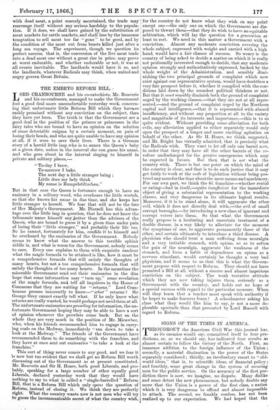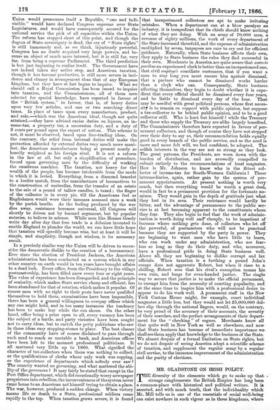SIGNS OF THE TIMES IN AMERICA.
THROUGHOUT the American Civil War this journal has, as its enemies would say, committed itself to four pre- dictions, or, as we should say, has indicated four results as almost certain to follow the victory of the North. First, an immense addition to the foreign influence of the Union ; secondly, a material diminution in the power of the States separately considered ; thirdly, an involuntary resort to "
old-
world ideas," that is, to scientific ideas, of financial policy ; and fourthly, some great change in the system of securing men for the public service. On the accuracy of the first pre- diction there is now, we imagine, no dispute. Many dislike and some detest the new phenomenon, but nobody doubts any more that the Union is a power of the first class, a nation which it is very dangerous to offend and almost impossible to attack. The second, we frankly confess, has not been realized up to our expectation. We had hoped that the Union would pronounce itself a Republic, " one and indi- visible," would have declared Congress supreme over State Legislatures, and would have consequently secured for the national service the pick of all capacities within the Union. The reform has stopped short of this point, and though the dogma of State sovereignty is dead, the cry of " State rights" is still immensely and, as we think, injuriously powerful. Congress has no doubt acquired very large powers, and be- come an object of much more interest, but it is still far, very far, from being a supreme Parliament. The third prediction is but just beginning to realize itself. The Government have not indeed taken any active step, and American taxation, though it has become productive, is still more severe in inci- dence and clumsy in arrangement than that of any European kingdom, but they have at last begun to inquire. What we should call a Royal Commission has been issued to inquire into taxation, and the Commissioners, all of them men selected for special knowledge, have reported in favour of the " British system," in favour, that is, of heavy duties upon very few articles, and one or two searching direct taxes. In place of taxes upon every manufacture, product, and sale,—which was the American ideal, though not quite attained,--they have advised excise duties on liquors, an in- come-tax, a property tax, a succession duty, and a duty of 3 cents per pound upon the export of cotton. This scheme is not, it must be observed, based upon free-trading ideas. On the contrary, the relief from internal duties will make the protection afforded by external duties very much more mani- fest, the American manufacturer being at present nearly as heavily weighted as his foreign rival. It is not a reform in the law at all, but only a simplification of procedure, forced upon governing men by the difficulty of working the cumbrous machine. The taxation, not heavy for the wealth of the people, has become intolerable from the mode in which it is levied. Everything, from a diamond bracelet to a lucifer match, from the manufactures of locomotives to the construction of umbrellas, from the transfer of an estate to the sale of a pound of tallow candles, is taxed ; the finger of the collector is in every pie, till the Americans feel as Englishmen would were their incomes assessed once a week by the parish beadle. As the feeling produced by the war dies away, resistance becomes universal, till Congress will shortly be driven not by learned argument, but by popular outories, to believe in science. While men like Horace Greely write day after day that free trade is a delusion invented to enable England to plunder the world, we can have little hope that taxation will speedily become wise, but at least it will be simple, and simplicity, though not wisdom, is its necessary result.
In a precisely similar way the Union will be driven to recon- sider the democratic dislike to the creation of a bureaucracy. Ever since the election of President Jackson, the American administration has been conducted on a system which in any other country on earth would in ten years have brought affairs to a dead lock. Every office, from the Presidency to the village postmastership, has been filled anew every four or eight years. The value of experience has been disregarded, and the principle of seniority, which makes State service cheap and efficient, has been abandoned for that of rotation, which makes it popular. Of course men with no right to their posts have never qualified themselves to hold them, examinations have been impossible, there has been ageneral willingness to overpay offices which any one might hold, and in too many instances the tendency has been to make hay while the sun shone. On the other hand, office being a prize open to all, every vacancy has been the subject of a battle, and party victories have been sought not to carry ideas, but to enrich the petty politicians who saw in those ideas easy stepping-stones to place. The best classes of the community have of course disdained to pass through such mud to reach so unstable a bank, and American offices have been left to the meanest professional politicians. It all mattered very little up to 1860. What signified the character of tax-collectors when there was nothing to collect, or the qualifications of clerks whose only work was copying, or the experience of departments which nobody ever saw ? The country wanted no governing, and what mattered the abi- lity of the governors ? It may fairly be stated that except in the Post Office department, which did occasionally worry newspaper proprietors into rebellion, the inconveniences of the system never came home to an American not himself trying to obtain a place. The war, however, produced a sudden change. When victory means life or death to a State, professional soldiers come rapidly to the top. When taxation grows severe, it is found that inexperienced collectors are apt to make irritating mistakes. When a department can at a blow paralyze an industry, it is inexpedient that its chiefs should know nothing of what they are doing. With an army of ra,000 men, a. revenue of eighty millions, the work of every department of the State increased threefold, and the expense of administration multiplied by seven, taxpayers are sure to cry out for efficient guidance. Naturally, when State business affects their own, they apply to State business the rules they find successful in their own. Merchants in America are quite aware that cceteris paribus an experienced clerk is better than an inexperienced one, that civil emplaye'3 conciliate customers, that if you want a. man to stay long you must ensure him against dismissal, that a partner who cannot be dismissed works harder than a clerk who can. Consequently, State business. affecting themselves, they begin to doubt whether it is expe- dient that every official should be dismissed every four years, and be liable to dismissal every day of the four. That may be needful with great political persons, whose first neces- sit? is to remain en rapport with public opinion, but suppose- a tax-collector to be behind public opinion, and to be a good collector still. Who is hurt but himself ? while the Treasury and those who supply the Treasury are alike largely benefited. The Commissioners therefore have reported in favour of per- manent collectors, and though of course they have not stepped' over their duty to say so, their recommendation holds equally- good in every branch of the public service, and as the need is more and more felt will, we feel confident, be adopted. The- selfish interests in the way are not so strong as they look. The great patrons, the Presidents, are worn down with the burden of distribution, and are avowedly compelled to> submit entirely to the recommendations of local magnates.. How is Mr. Johnson to know who is the fittest col- lector of income-tax for South-Western California ? These intermediaries, again, rather gain by the system of per- manent appointments. At present nothing is worth very- much, but then everything would be worth a great deal, would in fact be a permanent provision for the fortunate no- minee. They would gain in the depth of gratitude just what they lost in its area. Their resistance would hardly be bitter, and the advantage of permanence to the public ser- vice is at last becoming apparent to the constituents whom they fear. They also begin to feel that the work of adminis- tration is worth doing well and' cheaply, to be impatient of bureaus where nothing gets done, of collectors who let off the powerful, of postmasters who will not be punctual because they are supported by the party in power. They- are beginning to want men who have little to learn, who can work under any administration, who are fear- less so long as they do their duty, and who, moreover,
have a professional pride in doing State business well. Above all, they are beginning to dislike corrupt and lax
officials. When taxation is a farthing a pound John's escape does not aggravate Robert, but when it rises to a shilling, Robert sees that his rival's exemption means his. own ruin, and longs for even-handed justice. The single, way to secure that justice is to make the official permanent, to exempt him from the necessity of courting popularity, and: at the same time to inspire him with a professional desire to, appear to do his work well. A permanent staff in the New York Custom House might, for example, court individual magnates a little less, but they would not let 25,000,000 dol-
lars slip through the national fingers, would, on the contrary, be very proud of the accuracy of their accounts, the severity of their searches, and the perfect arrangements of their depart- ment for the " checking " of rogues. Merchants know all that quite well in New York as well as elsewhere, and now that State business has become of immediate importance we- shall seethem apply that knowledge to the business of the State. We almost despair of a formal limitation on State rights, but we do not despair of seeing America adopt a scientific scheme- of taxation, and supplement the regular army by a regular civil service, to the immense-improvement of the administrations and the purity of elections.































 Previous page
Previous page